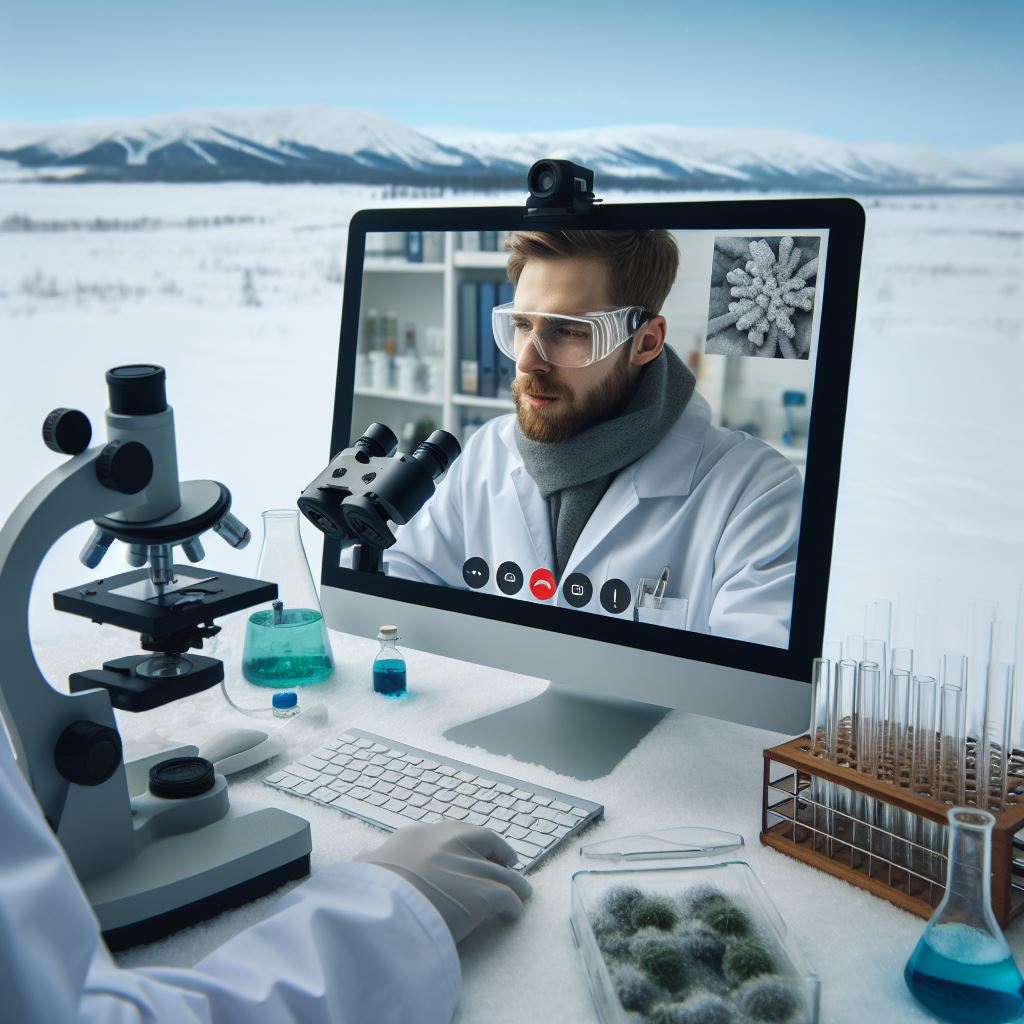Introduction
A. Lab technicians play a crucial role in the medical field by conducting various tests and analyses like essential diagnostic tests that aid in disease identification, treatment planning, and patient care.
These professionals analyze samples, such as blood or tissue, using advanced laboratory equipment to detect abnormalities and provide accurate results to physicians.
Their precise work ensures the reliability of medical diagnoses and contributes to the overall effectiveness of healthcare.
Lab technicians also play a vital role in research, helping advance medical knowledge and develop new treatments.
Their meticulous attention to detail and technical expertise make them indispensable in maintaining the quality and integrity of healthcare services.
The purpose of this blog post is to provide readers with interviews of Canadian lab techs.
Gain insight into the real experiences of lab technicians working in Canada’s medical laboratories.
Overview of lab technician profession in Canada
Education and training requirements
- Lab technicians in Canada typically require a diploma or degree in medical laboratory science.
- Some programs may also require completion of specific prerequisite courses in biology and chemistry.
- Training programs focus on developing skills in laboratory techniques, analysis, and scientific research methods.
- Students also receive hands-on experience through internships or clinical placements in various healthcare settings.
- Many provinces in Canada also require lab technicians to be registered or licensed with a professional regulatory body.
Skills and qualities needed for success in the profession
- Attention to detail is crucial as lab technicians perform complex tests and experiments.
- Strong analytical and problem-solving skills are essential for interpreting and analyzing test results.
- Effective communication skills are important for collaborating with other healthcare professionals and conveying test findings.
- Lab technicians should have good manual dexterity and be comfortable working with various laboratory equipment and instruments.
- They must also have a solid understanding of scientific principles and be able to follow strict protocols and procedures.
Job outlook and career growth opportunities
- The job outlook for lab technicians in Canada is positive, with a growing demand for skilled professionals.
- Advancements in medical technology and increased healthcare needs contribute to this demand.
- Lab technicians can find employment in various settings, including hospitals, clinics, research institutes, and pharmaceutical companies.
- There are opportunities for specialization in areas such as hematology, microbiology, clinical chemistry, and immunology.
- Career growth opportunities exist for lab technicians to progress into roles like senior lab technologists or laboratory managers.
In fact, becoming a lab technician in Canada requires specific education and training, along with essential skills and qualities.
Lab technicians play a critical role in healthcare by performing various laboratory tests and experiments. The profession offers a positive job outlook and opportunities for career growth and specialization.
Read: Canadian Chemical Industry: Trends and Jobs
First Interview: Jane Smith – A journey towards becoming a lab tech
Background and motivation to pursue a career in lab technology
- Jane Smith, a Canadian lab tech, was always fascinated by science and its practical applications.
- She had a natural curiosity that drove her to explore different fields within the science industry.
- After researching various career options, Jane discovered lab technology and immediately felt drawn to it.
- The idea of working in a laboratory, conducting experiments and analyzing results, excited her.
Educational path and certifications obtained
- Jane pursued a bachelor’s degree in Biology from the University of Toronto to lay the foundation for her career.
- During her studies, she focused on courses related to genetics, biochemistry, and laboratory techniques.
- As part of her academic program, she completed a co-op placement at a renowned research facility.
- This experience allowed her to gain hands-on exposure to lab equipment and techniques.
- After graduating, Jane pursued a postgraduate diploma in Medical Laboratory Technology.
- She obtained relevant certifications, including the Certified Medical Laboratory Technologist (CMLT) designation.
Challenges faced during training and internships
- One of the main challenges Jane faced during her training was the volume of theoretical knowledge she had to absorb.
- Understanding complex laboratory procedures and mastering the use of specialized equipment was also demanding.
- During her internships, Jane encountered real-world scenarios that required quick thinking and problem-solving skills.
- Handling delicate samples and maintaining strict quality control standards were additional challenges she faced.
Current role and responsibilities as a lab tech
- Currently, Jane works as a lab technician at a leading research institute in Vancouver.
- Her responsibilities include analyzing samples, preparing various solutions, and conducting experiments.
- Jane is also involved in the development and implementation of new laboratory procedures and protocols.
- She collaborates with a team of researchers and scientists to generate accurate and reliable data.
Advice for aspiring lab techs
- Jane highly recommends gaining practical experience through internships or co-op programs.
- Hands-on exposure to lab environments helps develop essential skills and problem-solving abilities.
- She suggests building a strong foundation in biology, chemistry, and related scientific disciplines.
- Continuous learning is essential for staying updated with the latest advancements in lab technology.
- Jane emphasizes the importance of attention to detail, organization, and effective communication skills.
Read: Essential Skills for Chemists in Today’s Canada

Second Interview: John Anderson – Lab tech experiences in a research setting
Introduction to John’s passion for research
- John Anderson is a highly dedicated lab tech with a strong passion for scientific research.
- He believes that research plays a crucial role in advancing knowledge and improving healthcare outcomes.
- John’s enthusiasm for research is contagious, and his colleagues admire his commitment and work ethic.
Academic and research background
- John holds a Bachelor’s degree in Biology from the University of Toronto.
- During his undergraduate studies, he conducted research projects in various laboratories.
- He developed excellent laboratory skills and gained a deep understanding of research methodologies.
Projects and advancements made as a lab tech
- As a lab tech, John has been involved in several exciting and groundbreaking research projects.
- He has contributed to the development of new diagnostic tests for a range of diseases.
- John’s meticulous attention to detail and analytical thinking have been instrumental in achieving accurate and reliable results.
- His ability to troubleshoot experimental procedures has helped to identify and resolve technical issues.
Collaboration with other researchers and professionals
- John believes that collaboration is key to successful research outcomes.
- He actively collaborates with researchers from different disciplines, including biochemists and geneticists.
- Working together allows for a diverse range of perspectives and enhances innovation in the laboratory.
Impact of research work on healthcare outcomes
- John is inspired by the potential impact of his research on improving healthcare outcomes.
- He believes that the discoveries made in the lab can directly translate into better patient care.
- John has witnessed firsthand how research findings have guided the development of new treatments.
Insights and tips for future lab techs interested in research roles
- John advises aspiring lab techs interested in research roles to gain as much hands-on experience as possible.
- He suggests volunteering or working in labs during their academic studies.
- John also emphasizes the importance of staying updated with the latest scientific literature.
- He recommends attending conferences and networking with professionals in the field.
Generally, John Anderson’s experiences as a lab tech in a research setting highlight the significance of research in advancing healthcare outcomes.
Through his passion, collaboration with other researchers, and dedication to staying up-to-date with the latest scientific advancements, John has made significant contributions to various research projects.
His insights and tips serve as valuable advice for aspiring lab techs interested in research roles.
Read: Women in Chemistry: Trailblazers in Canada
Find Out More: Breaking Into the Research Analyst Field in Canada
Third Interview: Sarah Thompson – A lab tech’s perspective in a hospital setting
Sarah’s introduction to the healthcare field
- Sarah Thompson, a dedicated and passionate lab technician, has been working in the healthcare field for over a decade.
- Driven by a desire to make a real difference in people’s lives, Sarah pursued a career in lab technology.
- Her journey began with a Bachelor’s degree in Medical Laboratory Science, followed by extensive on-the-job training.
Transitioning from research to a hospital environment
- Prior to joining the hospital lab, Sarah worked in a research laboratory, conducting experiments and analyzing data.
- The transition to a hospital setting was challenging but exciting for Sarah, as she welcomed the opportunity to work directly with patients.
- She found it fascinating to apply her research skills to real-life medical situations, contributing to the diagnosis and treatment of patients.
Daily tasks and responsibilities as a hospital lab tech
- As a hospital lab tech, Sarah’s day is filled with a variety of tasks, each crucial to patient care.
- She collects and analyzes samples, performs tests, and ensures the accuracy and reliability of the results.
- Collaboration with other healthcare professionals, such as doctors and nurses, is an integral part of her job.
Importance of accuracy and efficiency in a fast-paced setting
- In a fast-paced hospital environment, accuracy and efficiency are of utmost importance.
- Sarah emphasizes the need to pay attention to detail, double-checking every step to avoid errors that could impact patient outcomes.
- She understands that her work directly influences decisions made by medical professionals, and that responsibility drives her to excel.
Challenges and rewards of working in a hospital
- Working in a hospital comes with its fair share of challenges, including high stress levels and the need to prioritize tasks effectively.
- However, the rewards far outweigh the challenges for Sarah, as she experiences the satisfaction of helping patients every day.
- Seeing someone’s health improve due to accurate and timely test results fills her with a profound sense of purpose.
Advice for individuals considering a career in hospital lab technology
- For those considering a career as a hospital lab tech, Sarah offers some valuable advice.
- She encourages individuals to possess a strong attention to detail, as well as excellent problem-solving and communication skills.
- Additionally, a genuine passion for science and a desire to contribute to patient care are essential for long-term success in this field.
In general, Sarah Thompson’s perspective as a lab tech in a hospital setting sheds light on the exciting and challenging nature of the profession.
With her strong background in research and dedication to accuracy, Sarah exemplifies the qualities required to thrive in this fast-paced environment.
Her experiences and insights serve as valuable guidance for anyone considering a career in hospital lab technology.
Read: Chemistry Degrees: Best Canadian Universities
See Related Content: Interview Prep: Research Analyst Roles in Canada
Find Out More: Balancing Economy & Ecology: A Scientist’s View
Conclusion
Recap of the interviews and key insights
Throughout these interviews with Canadian lab techs, we gained valuable insights into their work experiences.
From the challenges they face to the rewarding aspects of their profession, we learned a great deal.
Appreciation for the contributions of lab techs in Canada
It is important to recognize and appreciate the crucial role lab techs play in Canada’s healthcare system.
Unlock Your Career Potential
Visualize a clear path to success with our tailored Career Consulting service. Personalized insights in just 1-3 days.
Get StartedTheir dedication and expertise are essential in providing accurate diagnoses and quality patient care.
Encouragement for aspiring lab techs to pursue their passion
To all those aspiring to become lab techs, we encourage you to pursue your passion.
The field offers endless opportunities for growth, personal satisfaction, and making a positive impact on people’s lives.
Closing thoughts on the diverse roles and experiences within the profession
As we conclude this series of interviews, it’s clear that lab techs have diverse roles and experiences.
From working in hospitals to research institutions, their contributions are invaluable in advancing scientific knowledge and improving healthcare outcomes.
We extend our gratitude to the lab techs who shared their stories with us. Your dedication and expertise are crucial in the healthcare field.
We hope this series has shed light on the important work you do and inspired others to pursue a career in this rewarding profession.




